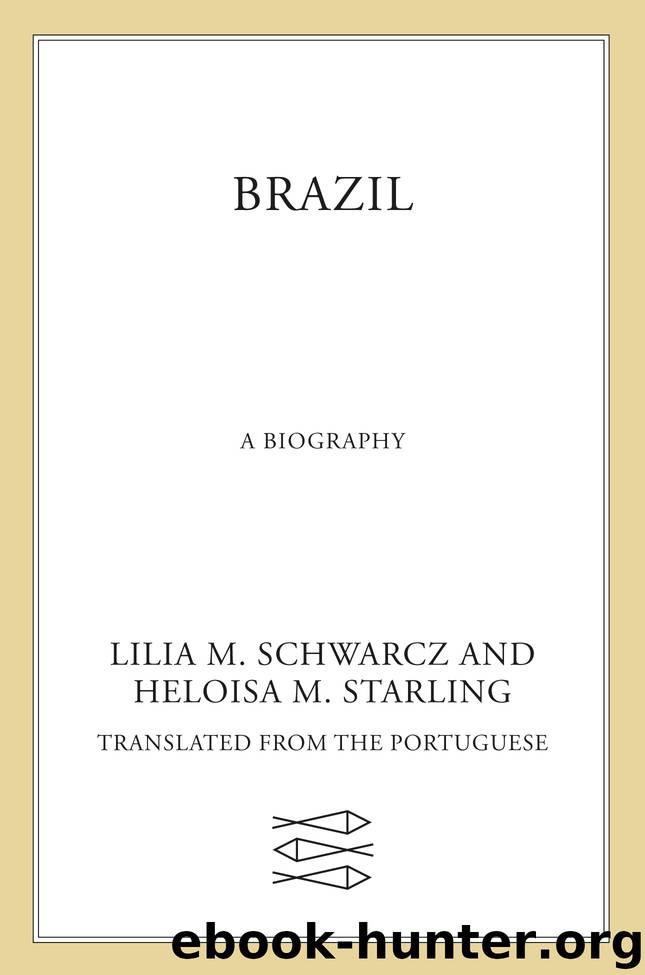Brazil--A Biography by Lilia M. Schwarcz

Author:Lilia M. Schwarcz
Language: eng
Format: epub
Publisher: Farrar, Straus and Giroux
14
Samba, Malandragem,1 Authoritarianism: The Birth of Modern Brazil
THROUGH THE VOTE, OR THROUGH ARMED CONFRONTATION: THE FIRST REPUBLIC WILL COME TO AN END
On 1 March 1930, on a carnival weekend, those Brazilians who could read and write went out to elect the next president of the Republic and the new federal deputies. This was to be the twelfth presidential election of the Brazilian Republic. The small number of voters – they were required to be adult, male and literate, amounting to just 5.6 per cent of the population – did not prevent the election from being as gripping and closely run as when Rui Barbosa had run against Hermes da Fonseca in 1910, twenty years earlier.2 Although Brazil had changed a great deal in the interim, and the candidates were new, the 1930 elections were in some ways reminiscent of that earlier dispute. The campaign took to the streets, spread throughout the states, and mobilized the country at political rallies – or ‘meetings’ as they were referred to at the time, in English. The popular engagement had brought two major issues to the fore: the rules and procedures for presidential succession and the policies of the republican government regarding social equality and citizens’ rights.
The elections of 1930 had all the feeling of the end of an era. The last president of the First Republic, Washington Luís, had abandoned the ‘governors’ policy’, endangering the tacit agreement between regional elites and the federal government. But no one expected him to interrupt the alternation of power between Minas Gerais and São Paulo by choosing the president of São Paulo, Júlio Prestes, as his successor.3 Washington Luís did not believe a republic was really governed by elections and votes; he thought governing required strict control of regional political forces. Until Júlio Prestes’s candidacy was launched in 1929, it had been business as usual: the regional elites controlled the state executives and, at federal level, power was distributed between the federal government and the states.
Washington Luís’s presidency had been uneventful, especially when compared to that of his predecessor, Artur Bernardes, who had governed for four years under a state of siege. The strong-armed tactics employed by the police against urban workers throughout the 1920s had reduced the number of strikes and weakened the trade unions. The ferocious opposition from the tenentes also seemed to have lost steam after 1927, when the last remaining participants in the Coluna Prestes/Miguel Costa, after crisscrossing almost the entire country, took refuge from the Brazilian troops in Bolivia and Paraguay.4
Washington Luís delayed the announcement of the official candidate for as long as he could. Throughout the First Republic, the unspoken agreement between the Union and the states meant that the winner of the presidential elections was a foregone conclusion: the president of the Republic nominated the official candidate, who received the full backing of the oligarchies throughout the country, making an electoral defeat all but impossible.
The presidential succession had become a ritual for the transference of power. It included a degree
Download
This site does not store any files on its server. We only index and link to content provided by other sites. Please contact the content providers to delete copyright contents if any and email us, we'll remove relevant links or contents immediately.
| Anthropology | Archaeology |
| Philosophy | Politics & Government |
| Social Sciences | Sociology |
| Women's Studies |
Cecilia; Or, Memoirs of an Heiress — Volume 1 by Fanny Burney(32561)
The Great Music City by Andrea Baker(32021)
Cecilia; Or, Memoirs of an Heiress — Volume 2 by Fanny Burney(31958)
Cecilia; Or, Memoirs of an Heiress — Volume 3 by Fanny Burney(31944)
We're Going to Need More Wine by Gabrielle Union(19050)
All the Missing Girls by Megan Miranda(16038)
Pimp by Iceberg Slim(14515)
For the Love of Europe by Rick Steves(14149)
Bombshells: Glamour Girls of a Lifetime by Sullivan Steve(14078)
Talking to Strangers by Malcolm Gladwell(13375)
Norse Mythology by Gaiman Neil(13372)
Fifty Shades Freed by E L James(13245)
Mindhunter: Inside the FBI's Elite Serial Crime Unit by John E. Douglas & Mark Olshaker(9346)
Crazy Rich Asians by Kevin Kwan(9295)
The Lost Art of Listening by Michael P. Nichols(7507)
Enlightenment Now: The Case for Reason, Science, Humanism, and Progress by Steven Pinker(7315)
The Four Agreements by Don Miguel Ruiz(6767)
Bad Blood by John Carreyrou(6625)
Weapons of Math Destruction by Cathy O'Neil(6283)
